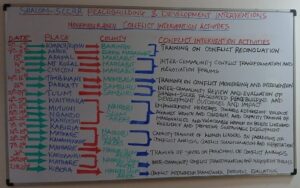
Ongoing facilitation with the teachers
The idea of Peace Education in schools is the growing conviction that for one to achieve lasting Peace in the world then one has to begin with the young generation. This means moving from talk to action and giving then the means. The assistance of shalom supporters world-wide to this process cannot be appreciated enough. Shalom-SCCRR recognizes the importance of targeting the younger generation by establishing trained and active Peace Clubs in inter-ethnic and inter-religious schools thereby fostering a culture of Peace among the students. All of the children targeted for this program have directly or indirectly experienced conflict and the impact of poverty.
By targeting both primary and secondary children, Shalom hopes to positively instil change in their perceptions, attitudes and beliefs towards the ethnic other. Shalom-SCCRR continues to support the implementation of the Clubs by also engaging the larger community.

The teachers engage in group discussions sharing ways of maximizing the activities of the Peace Clubs
On 11th of October 2017, Shalom held a workshop with teachers from 9 schools from Samburu County. Shalom has established Peace Clubs in 8 out of the 9 schools and brought together the Peace Club Patrons (PCPs) for a workshop. The aim of the workshop was to equip the PCPs with knowledge and skills in Peace Education as well as guide them on how to design Peace-building activities for the students targeted not only for within the school but also for their local communities.

A group photo with the teachers, CJPC coordinator, Shalom Staff and the Catholic Bishop of Maralal, Samburu County
Both the primary and secondary students have implemented various activities including writing and presenting Peace-poems to parents and teachers, compose and sing Peace songs performed during weekly school assemblies, peer counselling in order to improve student-student relations and sanitary activities around their respective towns while enlightening the community of the relationship between care for the environment and Peace. They also conducted thematic Peace walks around the immediate community as well as Peace talks and debates with other schools. Peace clubs have been very active in tree-planting both as a symbol of Peace in school and the community, and for the betterment of environment.
By establishing Peace clubs in interreligious and inter-ethnic composed schools, each with approximately 30 students core group, the activities of the programme are able to reach up to 5,000 students and community members in Samburu County with the message of Peace.
In addition to fostering a culture of Peace among the students, Shalom recognizes that Peace and Development go hand in hand. All the 9 schools have received substantial amount of support in terms of text books, desks and chairs, solar lighting units so students can read at any time and building materials to expand school facilities. Not only does this improve the teaching and learning environment for the school, but it directly contributes to academic performance, increased enrolment and retention of students in schools.

Teacher Aileen thanks Shalom for the establishment and support of the Peace Clubs
The Diocese of Maralal acknowledged the value that Shalom-SCCRR was adding through the Peace Education program when the Bishop interacted with the workshop participants. He lauded the fruitful collaboration between the Justice and Peace Commission (CJPC), and shalom-SCCRR. Similar perspective and convictions were strongly expressed and added to by Mr. Peter Lesooni the County Government Peace Coordinator, who was also in attendance, further endorsing the methodology of shalom – SCCRR .
Mrs. Aileen, a teacher and Peace Club patron at Suguta MarMar Primary acknowledged the contribution of Shalom in establishing the Peace club and supporting its activities. She noted with much gratitude how this had made an impact to her life, the school and the local community of Suguta MarMar. In her words she remarked “I have no words to thank Shalom and I encourage my fellow Peace club patrons in this workshop to believe in this pathway for Long term Peace and Harmony through the children.” At the close of the workshop the teachers (PCPs) were grateful and looked forward to more training which would enhance the implementation of the action plans were drawn and reviewed during the workshop.
By Esther Kibe and Francis Mwangi

